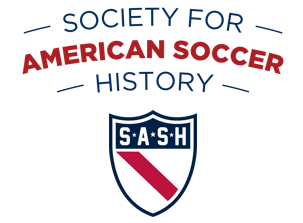The leading first-division goalscorer ever produced by the United States, with 260 goals in 10 American Soccer League seasons from 1921 to 1931.
Stark, who emigrated to the United States from Scotland as a teenager in 1912, gained his greatest fame in the 1920s with Bethlehem Steel of the original ASL. He already had played quite a bit of top-level soccer before he joined that team in 1924, seven seasons in the National Association Foot Ball League and three in the ASL.
In the 1924-25 ASL season, Stark scored 67 goals for Bethlehem in 44 games. That remains as the record for an American first-division goalscorer in a single season and won him a raise to $75 a week, the highest in American soccer at the time. Stark scored 75 goals in all games, including friendlies and cup games, during Bethlehem’s 1924-25 season.
Stark played six seasons for Bethlehem. He finally won his first league title there in 1927, and another with Kearny Irish in the reorganized ASL in 1934.
Most of Stark’s exploits came in league play, but he was with Kearny Scots when they won the American Football Association Cup in 1915 and with Bethlehem when it won the U.S. Open Cup in 1926. He made his first mark on American soccer, at age 17, by scoring the only goal of the 1915 AFA Cup final. Stark also was on the Paterson team that lost the Open Cup final to Bethlehem in 1919, after which he was one of several guest players added to the roster for Bethlehem’s European tour that summer. He also was a guest player on the Fall River Marksmen’s European tour in 1930.
After the Bethlehem Steel team was disbanded following the 1929-30 ASL season, Stark played for the Newark Americans, Brooklyn Wanderers and Kearny Irish in his final few seasons.
Stark played for the U.S. national team only twice, both against Canada in 1925. In one of those, a 6-1 victory in Brooklyn on Nov. 8, 1925, he scored five goals, a record for a U.S. player in a full international that 80 years later had been tied but never broken. In 1930, although he was still the leading American center forward, he was forced to pass up the inaugural World Cup, because of responsibilities at home with a new business venture.
Inducted in 1950.
